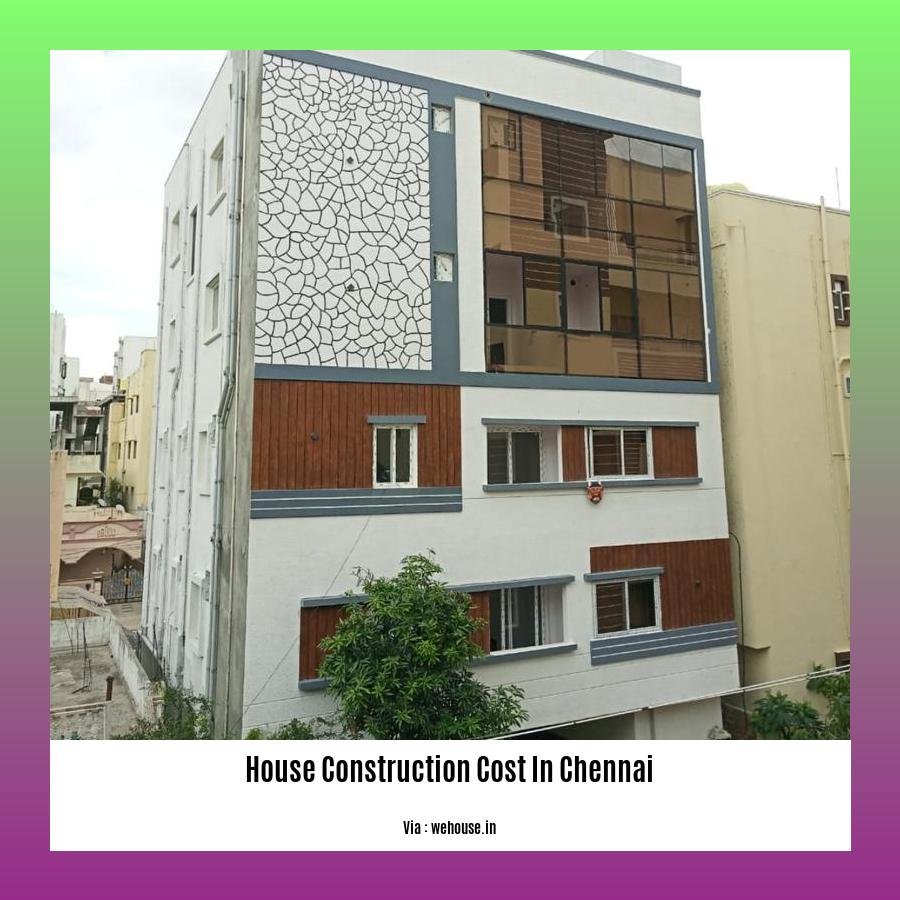Introducing “House Construction Cost in Chennai: A Comprehensive Guide for Informed Decisions,” your ultimate resource for navigating the intricacies of house construction costs in Chennai. This guide is meticulously crafted to empower you with the most up-to-date insights into material prices, labor rates, and regulatory requirements, arming you with the knowledge to make informed decisions throughout your building journey.
Key Takeaways:
- Expect construction costs to range from INR 1450/sq ft to INR 4500/sq ft.
- Location, building size, material quality, and labor costs influence construction costs.
- Secure necessary permits and approvals before starting construction.
- Choose a licensed contractor with a proven track record.
- Research and compare bids from multiple contractors.
- Consider online reviews and testimonials when selecting a contractor.
- Note that specific project details can impact construction costs.
House Construction Cost in Chennai

Navigating the construction of your dream home in Chennai involves understanding the intricate web of costs involved. From the foundation to the finishing touches, every aspect contributes to the overall expense.
Key Cost Factors
- Material Costs: Cement, steel, bricks, tiles—the list of materials used in construction is extensive. Their costs fluctuate with market conditions, affecting the overall budget.
- Labor Costs: Labor wages vary based on skill level and project complexity. Skilled workers command higher rates, while less experienced personnel may cost less.
- Plot Size and Building Design: The size of your plot and the complexity of your building design directly influence the cost of house construction in Chennai. A larger plot and an elaborate design result in higher expenses.
- Site Conditions: Topography, soil conditions, and other site-specific factors can impact construction costs. Uneven terrain or challenging soil conditions may require additional effort and expenses.
- Government Regulations: Building codes and regulations set by the government can impact construction costs by dictating specific construction methods or materials.
Example Budget
To provide a general idea, here’s an approximate budget for constructing a 1,500 sq ft house in Chennai:
| Expense | Cost |
|---|---|
| Materials | INR 10-15 lakhs |
| Labor | INR 5-7 lakhs |
| Site Preparation | INR 2-3 lakhs |
| Permits and Approvals | INR 1-2 lakhs |
| Contingency Fund | INR 2-3 lakhs |
Remember, this is just an estimate, and actual costs may vary based on your specific requirements.
Tips for Cost Optimization
- Consider cost-effective materials without compromising quality.
- Negotiate with contractors for competitive labor rates.
- Plan your budget carefully and stick to it.
- Seek professional guidance from architects or project managers to optimize costs.
To determine the construction cost of your dream home, use our house construction cost calculator. Are you planning to build a house in 2023? Get a precise estimate with our house construction cost calculator 2023. For those considering building a house in Canada, our house construction cost calculator Canada provides location specific insights. If you’re interested in building a house in Bangalore, check out our house construction cost in Bangalore calculator for tailored estimates.
Material Costs: The Sinews of House Construction in Chennai

Material costs are the backbone of house construction, accounting for a significant chunk of the overall budget.
Major Cost Contributors
- Cement: Essential for laying foundations, walls, and floors. Prices fluctuate with market demand and global supply.
- Steel: Reinforces concrete structures, ensuring stability and durability. Market conditions influence its cost.
- Bricks: Used for constructing walls and partitions. Their cost varies depending on quality and availability.
- Tiles: Enhance aesthetic appeal and provide durability to floors and walls. Prices vary based on type, design, and brand.
Factors Affecting Material Costs
- Market Fluctuations: Global events and economic conditions can impact material prices.
- Supply and Demand: Shortages or high demand for certain materials can drive up costs.
- Transportation Costs: Distance from production hubs or import costs can increase material prices.
- Government Regulations: Taxes, duties, and environmental policies can influence material costs.
Cost Optimization Tips
- Negotiate with suppliers for competitive rates.
- Choose cost-effective materials without compromising quality.
- Explore alternative materials or consider local sourcing to reduce transportation costs.
- Plan ahead and bulk order materials to secure discounts.
Key Takeaways:
- Material costs constitute a large portion of house construction expenses.
- Cement, steel, bricks, and tiles are major cost contributors.
- Market fluctuations, supply and demand, transportation costs, and government regulations impact material prices.
- Optimizing material costs through negotiation, alternative materials, and strategic planning can save money.
Source:
Site Conditions
The nature of your plot influences construction costs tremendously. Let’s explore how:
- Topography: Hilly or uneven terrain demands more site preparation, excavation, and retaining walls, inflating costs.
- Soil Conditions: Unstable soil requires specialized foundations like piling or grouting, adding to expenses.
- Drainage: Poor drainage necessitates additional measures such as French drains and sump pumps, increasing costs.
- Vegetation: Dense vegetation might necessitate clearing, stump removal, and grading, impacting the budget.
- Proximity to Utilities: Distance to utilities like electricity, water, and gas lines can affect the cost of installing connections.
Key Takeaways:
- Carefully assess site conditions before construction.
- Consider hiring a geotechnical engineer for soil analysis.
- Plan for additional costs if site preparation is extensive.
- Evaluate the availability of utilities and budget for necessary connections.
Citation:
Government Regulations
Understanding government regulations is crucial for constructing a house in Chennai. These regulations ensure safety, quality, and adherence to building codes.
Key Takeaways:
- Floor Space Index (FSI):
A parameter determining the maximum permissible built-up area on a plot. In Chennai, FSI for residential constructions is 2, allowing a maximum buildable area double the plot size.
- Building Code of India (BCI):
A set of national regulations defining minimum standards for building design and construction, including structural safety, fire protection, and accessibility.
- Local Building Bye-Laws:
Specific rules and regulations imposed by the local municipal corporation, governing aspects like building height, setbacks, and parking requirements.
- Environmental Regulations:
Compliance with regulations protecting the environment, such as waste management, energy efficiency, and noise control.
- Regularization of Unauthorized Construction:
Guidelines for legalizing unauthorized constructions that meet certain criteria, including payment of penalty fees and adherence to safety standards.
Citation:
FAQ
Q1: What are the key factors that influence the cost of house construction in Chennai?
Q2: What is the typical range of construction costs in Chennai, and how do they vary depending on the type of house being built?
Q3: What are the legal formalities and permits required for house construction in Chennai?
Q4: How can I find a reliable and experienced contractor for my house construction project in Chennai?
Q5: What are the advantages of using FSI regulations in Chennai, and how can they impact my construction project?
- White Tile Backsplash Kitchen: A Classic and Clean Design - November 17, 2025
- Backsplash For White Cabinets: Choosing The Right Kitchen Style - November 16, 2025
- White Kitchen Backsplash Ideas For a Timeless, Stylish Update - November 15, 2025










